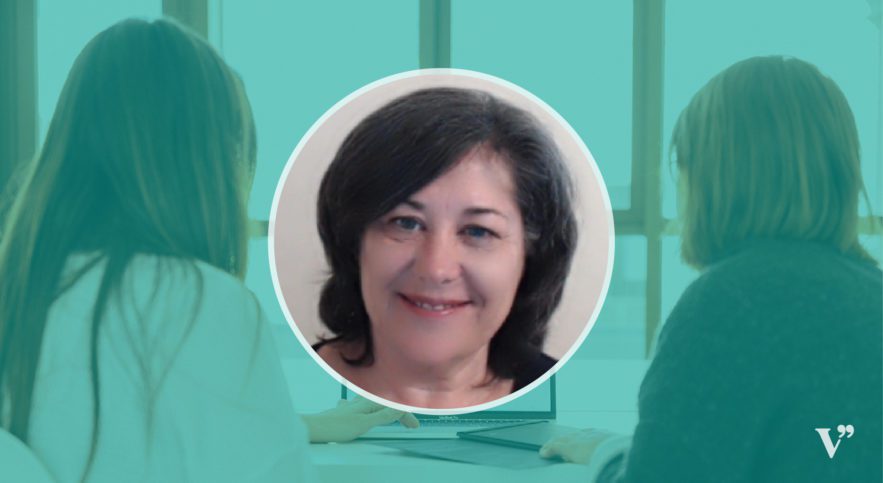Dionne Clabaugh, Ed.D., administrative faculty in the School of Human Development at Pacific Oaks College, has co-written a chapter for the textbook “Self-Learning and the Academic Evolution from Pedagogy to Andragogy.” Co-authored with Nora Dominquez, Ph.D., Director of the Mentoring Institute at the University of New Mexico, their chapter, “Mentoring to Become a Self-Directed Learner” reflects notions of educational theory that has been important to Dr. Clabaugh since she began her own educational journey.
As far back as kindergarten, Dr. Clabaugh was interested in her teachers and how they taught. Two vastly different experiences informed her beliefs about education. In fifth grade, she had a teacher who was deliberately cruel. “In my 10-year-old mind, I asked myself ‘what’s wrong with this picture?’” Dr. Clabaugh says. “Because I didn’t understand why anybody needed to be that mean to somebody.”
In contrast, Dr. Clabaugh attributes the success of her high school marching band to its director, John Riggle, for creating an environment that relied on teamwork and excellence to get the best out of everyone. “He talked a lot about esprit de corps,” she says, “and how what you do has an impact on others, and I really believe that our impact matters.”
The importance of mentoring adjunct faculty
In her post-secondary education, earning a B.A. in music therapy and a master’s in organizational development, Dr. Clabaugh nurtured this idea of a supportive team environment as being optimal for teaching and learning. For her dissertation while earning her Ed.D. in Learning and Instruction at the University of San Francisco, Dr. Clabaugh conducted a study that measured the differences in performance between adjunct faculty mentored in ASI strategies and a control group. She also surveyed students’ perceptions of engagement before and after mentoring, with both the treatment and control groups of faculty. This study, and the results that flowed from it, would come in useful later after she began teaching at the newly opened Pacific Oaks’ San Jose campus.
“As we were hiring faculty, it became obvious that many people wanted to teach at Pacific Oaks but didn’t know our pedagogy,” Dr. Clabaugh says. “Alumni also wanted to return to the college to teach as a way to give back, but they didn’t have the experience in a college classroom.” Thus, it became clear the college could benefit from a program that simultaneously addressed the strengths and needs of these two populations. The result was the creation of the adjunct faculty mentoring program in which she was able to put some of her scholarly research into practice. “It’s about developing a well-prepared adjunct faculty member,” she explains.
The program is based on Self-Determination Theory, a theory of motivation which is centered on meeting three psychological needs: belonging, competence, and autonomy. Pacific Oaks’ approach relies heavily on satisfying those three needs.
Effective mentoring can make all the difference
While continuing her research on faculty development, Dr. Clabaugh discovered the Mentoring Institute through a Google search, reached out to Dr. Dominguez, its director, and asked her to mentor her as a way to move the mentoring program at Pacific Oaks forward.
“Dr. Dominguez became excited about what we’re doing here because nobody else in the nation is mentoring adjunct faculty,” Dr. Clabaugh says. “And they certainly weren’t doing any mentoring with the same theoretical framework that I’m using. She saw it as something that needed to be shared.”
Those early discussions led to a successful mentor-mentee relationship in which Dr. Clabaugh and Dr. Dominquez have collaborated on three book chapters, including this chapter on self-directed learning, which is written for college students who are first-year science majors. Two other chapters are in the works. They write about how to select a mentor, how to get the most out of a mentoring relationship, how to engage effectively and successfully with mentors, how mentoring prepares students for self-directed learning, and how to build a mentoring network. “It’s important to note that there’s no one theory of mentoring,” Dr. Clabaugh says, “because there are many different frameworks and intentions and purposes for mentoring.”
Ultimately, Dr. Clabaugh believes that whether you are empowering college students to be self-directed learners or mentoring adjunct faculty on ways to increase engagement in their classrooms, the objective is to promote college success skills so that as people as possible are primed to succeed with college education; effective mentoring for students and faculty can make that happen. “I want people to realize that human development is not a job,” she says. “It’s an approach, and it’s an investment in making ourselves better, with more skills, more tools, more self-awareness, and more capacity to meet other people’s needs.”
________________________________________________________________________________
Visit the School of Human Development program page to learn more or fill out the form below.

